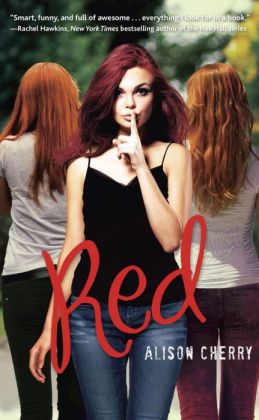Red, by Alison Cherry
Dec 9
2013

Alison Cherry's debut novel Red has its charms: her heroine is relatable and plausibly flawed, and she has the fun, flowing writing style of a much more experienced author. Unfortunately, the tone of her story kept flip-flopping between campy and realistic, ultimately failing at both.
Felicity St. John is a would-be beauty queen from Scarletville, Iowa, a town founded as a refuge for redheads. While the town professes to love all of its residents, redheads clearly rule, and nowhere is that more evident than in the local high school, where students take classes like “History of Redheadedness” and casually bully the town's minority population (of brunettes and blondes). Felicity is in the running for the annual Miss Scarlet Pageant, but she's hiding a terrible secret: her beautiful copper-colored hair comes out of a bottle. When an unknown blackmailer threatens to out her as an “artie”, Felicity has to choose between obeying a series of increasingly bizarre demands or exposing herself as a lifelong liar.
There are two ways to take this book: as straight entertainment or as a metaphor for something bigger. Both options, sadly, are problematic. Every time I shut my brain off and let myself get sucked into the story, some fresh detail popped up and kicked me back out. Is this supposed to be some kind of alternate reality? Why is it news to the heroine that there are other competent hair salons out there? I understand that redheads get preferential treatment in Scarletville, but why are they trying to cut in lines and stuff when they're out of town? And why can't anybody successfully Google the 3+ million suggestions for “How To Dye Your Hair a Natural Shade of Red”? So many questions, so few coherent answers...
But if I look at Red as as metaphor for a greater issue, it gets worse. The plight of an attractive, talented, middle-class white girl whose biggest problem is that she has to dye her hair a few shades darker to fit into to the upper echelon of her small-town high school's popularity rankings is not exactly heart-wrenching. It really doesn't work as a metaphor for racial inequality, and it doesn't even have anything plausible to say about ridiculous high school beauty standards. The brisk charm of Cherry's writing style covers up a lot of flaws, but one hopes her next book is about more than a non-issue blown up to ridiculous proportions.
Review based on publisher-provided copy.
Felicity St. John is a would-be beauty queen from Scarletville, Iowa, a town founded as a refuge for redheads. While the town professes to love all of its residents, redheads clearly rule, and nowhere is that more evident than in the local high school, where students take classes like “History of Redheadedness” and casually bully the town's minority population (of brunettes and blondes). Felicity is in the running for the annual Miss Scarlet Pageant, but she's hiding a terrible secret: her beautiful copper-colored hair comes out of a bottle. When an unknown blackmailer threatens to out her as an “artie”, Felicity has to choose between obeying a series of increasingly bizarre demands or exposing herself as a lifelong liar.
There are two ways to take this book: as straight entertainment or as a metaphor for something bigger. Both options, sadly, are problematic. Every time I shut my brain off and let myself get sucked into the story, some fresh detail popped up and kicked me back out. Is this supposed to be some kind of alternate reality? Why is it news to the heroine that there are other competent hair salons out there? I understand that redheads get preferential treatment in Scarletville, but why are they trying to cut in lines and stuff when they're out of town? And why can't anybody successfully Google the 3+ million suggestions for “How To Dye Your Hair a Natural Shade of Red”? So many questions, so few coherent answers...
But if I look at Red as as metaphor for a greater issue, it gets worse. The plight of an attractive, talented, middle-class white girl whose biggest problem is that she has to dye her hair a few shades darker to fit into to the upper echelon of her small-town high school's popularity rankings is not exactly heart-wrenching. It really doesn't work as a metaphor for racial inequality, and it doesn't even have anything plausible to say about ridiculous high school beauty standards. The brisk charm of Cherry's writing style covers up a lot of flaws, but one hopes her next book is about more than a non-issue blown up to ridiculous proportions.
Review based on publisher-provided copy.
Posted by: Julianka
No new comments are allowed on this post.
Comments
No comments yet. Be the first!